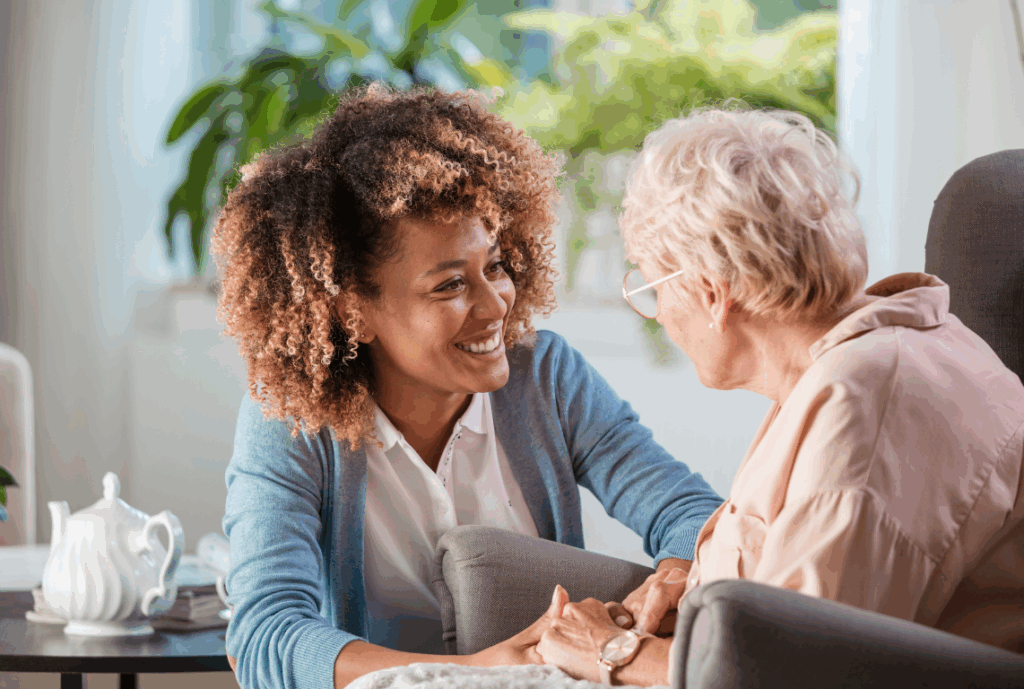What Does an
In-Home Personal Care Attendant do for Older Adults?
By Perfect Care Match · 7 min read · Senior Wellness

Non-medical in-home support empowers seniors to stay safely in their own homes by reducing falls and infections, ensuring nutrition and hydration, inspecting for skin injuries, and providing vital companionship.
Key Takeaways
-
Maintain Independence & Safety
Personalized daily support helps seniors navigate routines—like stairs or the bathroom—so they stay active and out of the hospital. -
Prevent Health Emergencies
Regular supervision lowers the risk of urinary tract infections and fall-related ER visits. -
Early Warning Detection
Caregivers inspect skin for pressure sores or bruises and report concerns for swift follow-up. -
Nutritional Support
Guarding against malnutrition with support from grocery shopping to balanced meal prep, hydration reminders and dietary monitoring. -
Meaningful Companionship
Shared activities, conversations, and outings reduce loneliness, boost mood, and engage the mind.
Why In-Home Support Matters
Over 90 percent of seniors express a strong preference to remain in their own homes, cherishing familiar surroundings and routines. Yet as cognitive and physical challenges emerge, daily tasks—climbing stairs, preparing meals, managing medications—can become daunting. In 2025, an estimated 7.2 million Americans age 65 and older live with Alzheimer’s, and countless more face mobility or sensory limitations. Non-medical home care bridges the gap between independence and safety. A caregiver’s steadying hand, thoughtful reminders, and friendly companionship not only preserve dignity but also empower seniors to continue living life on their own terms.
Avoiding Hospitalizations
Unplanned hospital stays take a heavy toll on seniors’ health and finances. Falls remain the leading cause of injury-related death among adults 65 and older, with nearly 3 million fall-related ER visits and 38,742 deaths in 2021. Similarly, urinary tract infections account for up to 15 percent of infectious-disease hospital admissions in older adults, often leading to dehydration, delirium, or more serious complications.
By providing daily oversight—conducting home-hazard checks, assisting with safe transfers, supporting hygiene routines, and closely monitoring health changes—caregivers can intercept these risks early, helping seniors avoid emergency room trips and lengthy recoveries.
The Role of Non-Medical Care Professionals
Caregivers and homemakers deliver more than chores—they provide holistic support:
Activities of Daily Living
Bathing, dressing, toileting, and mobility assistance keep routines effortless.Safety Monitoring & Reporting
Home-hazard inspections and daily skin checks for sores or bruises—and immediate reporting to our nursing team.Medication & Appointment Reminders
Ensuring all prescriptions are taken on time, plus transportation to visits.Environment & Comfort
Light housekeeping, laundry, and clutter-free walkways enhance safety and ease.Engagement & Interaction
Games, walks, conversations, and shared hobbies to nurture emotional health.
Promoting Nutrition & Hydration
Nutrition and fluids are cornerstones of senior health. One study found that 16% of independent older adults are at high risk for malnutrition while up to 60% of older adults in health care settings are malnourished.
Caregivers:
Shop for fresh, balanced groceries.
Prepare meals tailored to dietary requirements.
Offer gentle hydration prompts throughout the day.
Track weight and appetite changes—reporting any concerns.
Combating Isolation & Loneliness
Social connection plays a vital role in mental and emotional health. In a 2023 survey, 34 percent of adults aged 50–80 reported feeling socially isolated at least some of the time. Caregivers do more than provide physical assistance; they become companions—engaging in conversation, sharing hobbies like games or music, and accompanying seniors on outings. This meaningful interaction reduces feelings of loneliness, lifts mood, and even supports cognitive engagement. Regular, friendly visits can transform a senior’s day, reinforcing that they are seen, heard, and valued.
